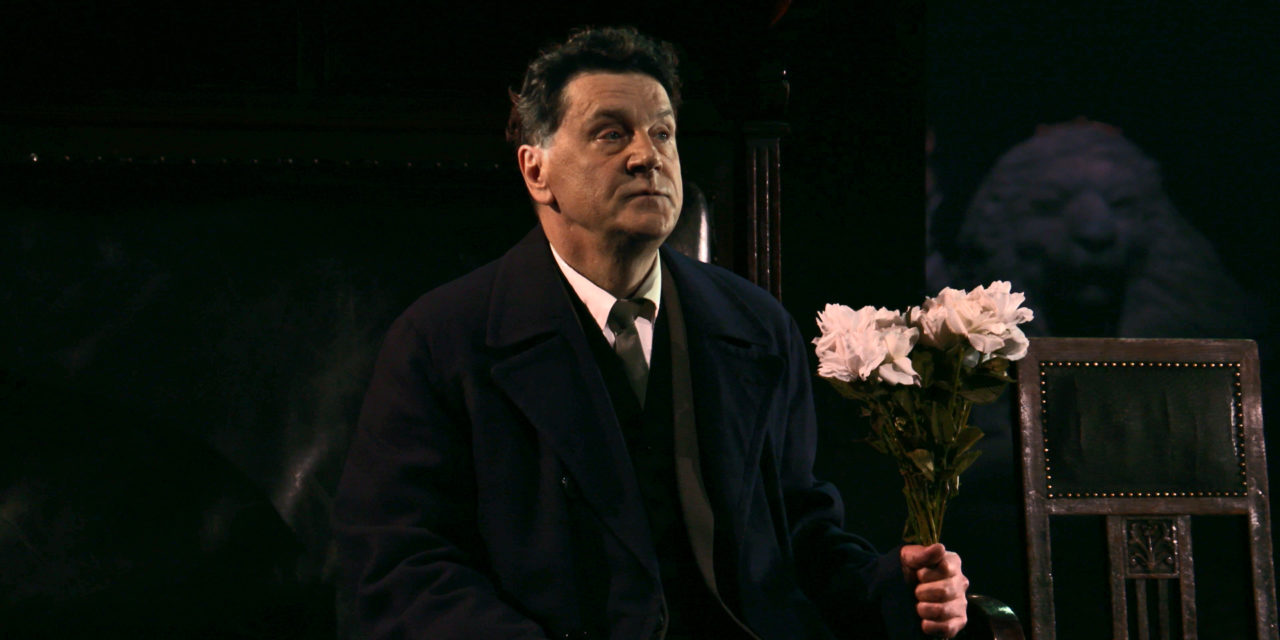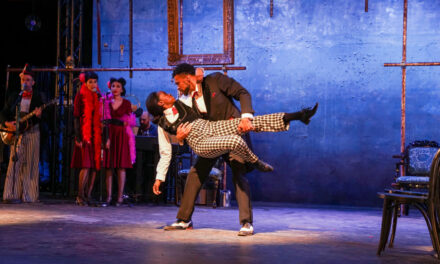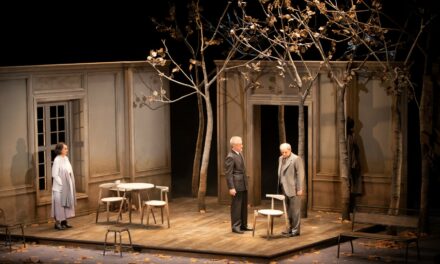Amid the deep velvety gloom that submerges the entire upstage in Rimas Tuminas’s Uncle Vanya, the sparse objects of the world stand out: sawdust and shavings scattered across an oversized, rough-hewn worktable at the proscenium; the silvery glint of a large metal hoop with which the actors play children’s games; the weather-worn, life-sized stone statue of a reclining lion that peeks out from the darkness. The soundscape of the play is similarly textured: at moments, the staccato plucking of violins highlights the tension between characters, while at others the rich, jazzy lamentations of horns lend a sense of wistfulness or nostalgia. Two men saw through a piece of wood; the metal hoop clangs against the stage as characters roll it back and forth; and, at the close of the first half, the clacking of children’s paddle balls—wooden balls hitting wooden paddles—does not so much fill the air as unveil, once again, the void from which this world emerges.
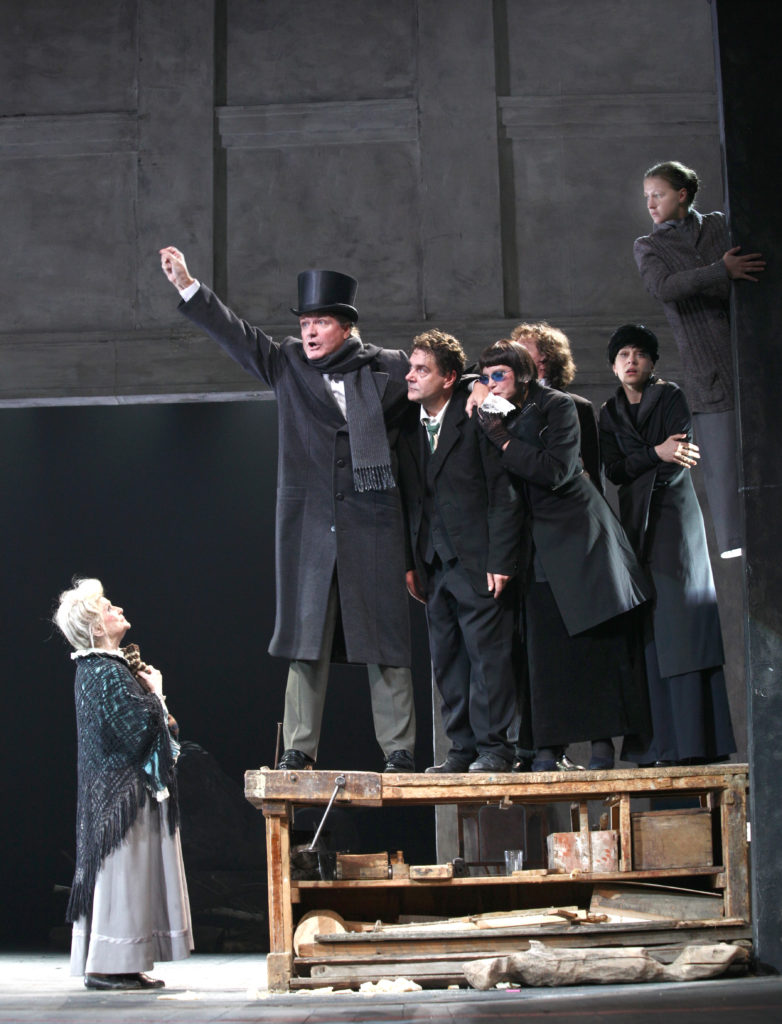
Ensemble, Uncle Vanya, dir. Rimas Tuminas, Vakhtangov Theatre, Moscow. Photo courtesy of Stage Russia HD.
Uncle Vanya, filmed live on the stage of Moscow’s Vakhtangov Theatre, is the third production of Stage Russia HD’s 2017–2018 season. This staging is particularly well suited to the cinematic presentation, which—with its alternating close-ups and full-stage shots—allows the spectator to feel immersed in the richness of textures without ever losing sight of the nothingness that envelops the stage and its players. Actors enter and exit through the upstage gloom, melting into and out of the darkness. Their existence is peppered with old-fashioned children’s toys and with antique oddities—from the huge glass onion bulb of off-colored alcohol that replaces the samovar of tea to the kerosene-powered magic lantern that Astrov uses to deliver his lecture on the region’s natural habitats—but the sense of futilely trying to fill the void is never far off.
It was only in the play’s second half (Chekhov’s third act) that the darkness revealed itself to be not quite so empty. The stone lion was just visible upstage beyond Elena (Anna Dubrovskaya) and Astrov (Artur Ivanov) during their illicit encounter, as she lay on the worktable and he stood over her. Only belatedly did it become clear that there were hands on the lion’s head, that the lion was in fact a three-dimensional sculpture and not just a painted backdrop: although a human face was not visible through the gloom, the hands made it clear that someone was behind the lion, watching the adultery unfold. The violin notes turned dark, menacing. The sense of danger in this moment was palpable. No less so was the sense of devastation moments later, as Astrov carried Elena to the abashed Vanya (Sergey Makovetskiy), setting her in his lap.
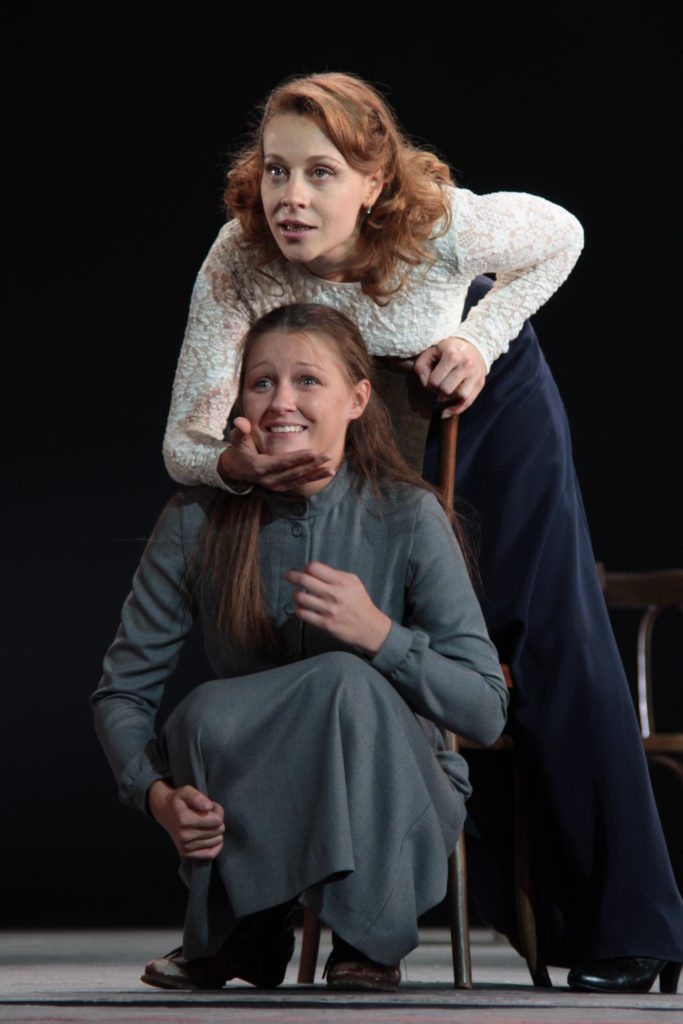
Anna Dubrovskaya (Elena) and Evgeniya Kregzhde (Sofya), Uncle Vanya, dir. Rimas Tuminas, Vakhtangov Theatre, Moscow. Photo courtesy of Stage Russia HD.
The Lithuanian director Tuminas, who has led the Vakhtangov since 2007, is today one of the leading theatre directors in Russia. Known for his “arrestingly strange” imagery and his “passion for striking visual symbolism” on a grand scale, Tuminas should be no stranger to Stage Russia HD audiences. His production of Eugene Onegin was showcased in Stage Russia HD’s inaugural season and features several of the same actors as Uncle Vanya. And yet, if the company of actors and poetic, evocative grandeur of the staging are familiar, this season’s offering is hardly a repeat of last season’s piece. Whereas Tuminas fractures the characters in last season’s Eugene Onegin, populating his stage (often simultaneously) with both elder and younger iterations of Onegin and Lensky, here his purpose seems to be to remove the century of clutter that we might expect to mark Chekhov’s texts, to allow—to quote Tuminas—the “sound of the ages” to shine through.
Uncle Vanya runs three hours with a single fifteen-minute intermission. For more information about the cinematic production and upcoming screenings, see the Stage Russia HD website.
This post was written by the author in their personal capacity.The opinions expressed in this article are the author’s own and do not reflect the view of The Theatre Times, their staff or collaborators.
This post was written by Jessica Hinds-Bond.
The views expressed here belong to the author and do not necessarily reflect our views and opinions.

